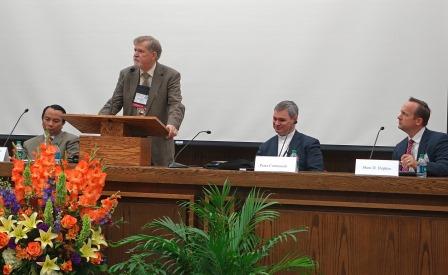Symposium 2014: Religious Responses to Secularisms

Reported by Jedediah Knight
Moderator: Shon D. Hopkin, Assistant Professor of Religious Education, Brigham Young University
Speakers: Most Reverend Peter Comensoli, Roman Catholic Archdiocese of Sydney, Australia; Mohd Hasbi Abu Bakar, President, Jamiyah Singapore; Rev. James Christie, Professor of Dialogue Theology; Director, Ridd Institute for Religion & Global Policy, University of Winnipeg, Canada
During the first break-out session of Symposium 2014, three religious leaders addressed issue of secularism and the status of religion and secularism in their respective countries.
Most Reverend Peter Comensoli presented provocative remarks on the responsibilities in secular environments of those who have religious affiliations. First, those who subscribe to a code of conduct and belief must reflect deeply on, and be able to aptly express, the reasons for their religious traditions. “Willing belief” is not sufficient; reason, not will, is the responsibility of religious adherents. Second, religious people ought to propose, not impose, their ideas. Third, tolerance is not the ideal paradigm for relations between religion and no religion. Tolerance paves the way for parties to entrench themselves in their separate camps without having to approach the other side. Rather, dialogue and friendship should be the paradigm. This idea was resisted by some in the audience, and it was proposed that tolerance is needed as a medium for dialogue. Bishop Comensoli urged, however, that when tolerance becomes the paradigm, it fosters division and prohibits engagement. When there is no engagement, there is no progress towards friendship. Finally, it is observed that when people immigrate from societies that are deeply materialistic and secular to societies that are more religious, there is a high level of conversion. Each human being has an innate sense of the transcendent. This provides hope for the future because it demonstrates that the secular paradigm will not always be the prevailing one.
Mohd Hasbi Abu Bakar presented an overview of religion and secularism in Singapore. Models of secularism depend upon how jurisdictional boundaries are defined, but, generally, a secular state is one that is not influenced by religion and treats all religions equally by avoiding preferential treatment. The model in Singapore is “secularism with a soul,” where religion does not mix with politics, but it can influence public policy. Indeed, Singapore is the world’s most religiously diverse country. The constitution protects the right to “profess, practice, and propagate” one’s religion, curtailed only by the requirement that one’s actions are not contrary to general law, public health, or morality. The government makes efforts to preserve social harmony, and it also makes efforts to protect the government from religious influence. Religions in Singapore must be registered, but even if one is not, its adherents still have the right to profess, practice, and propagate. Aggressive and insensitive proselyting is also restricted, and discrimination based on religion is prohibited. Singapore is accommodationist. Thus, religious holidays are recognized, and Sharia courts can be binding on adherents. The government is not interested in the veracity of adherents’ beliefs. Finally, the government prohibits religious organizations from being political, but they are encouraged to work with the government on implementing policies.
Reverend James Christie reflected on attitudes towards secularism in Canada. Secularism is the elephant in the room. There are four primary religious constituencies: (1) the devotedly religious, (2) the anti-religious, (3) the spiritual but not religions, and (4) the utterly indifferent. The dialogue between these groups is facilitated by the prevailing Canadian social value of peaceful coexistence: human rights. There are four themes that represent the struggle of religions to live together in Canada. First is the question of the appropriate nature of supervision of religion in a secular state. Religions help define the nature of supervision by supporting one another in their freedom of religious expression. Second is the ongoing process of engagement between religion and civil society. Religious leaders can come together to urge society towards goals in the development of the human condition. Third is making the question of secularism more tangible. Fourth is to encourage interreligious collaboration. To conclude, Canada is a secular society. There will be no peace until there is dialogue, and the dialogue must occur within the context of the secular society.